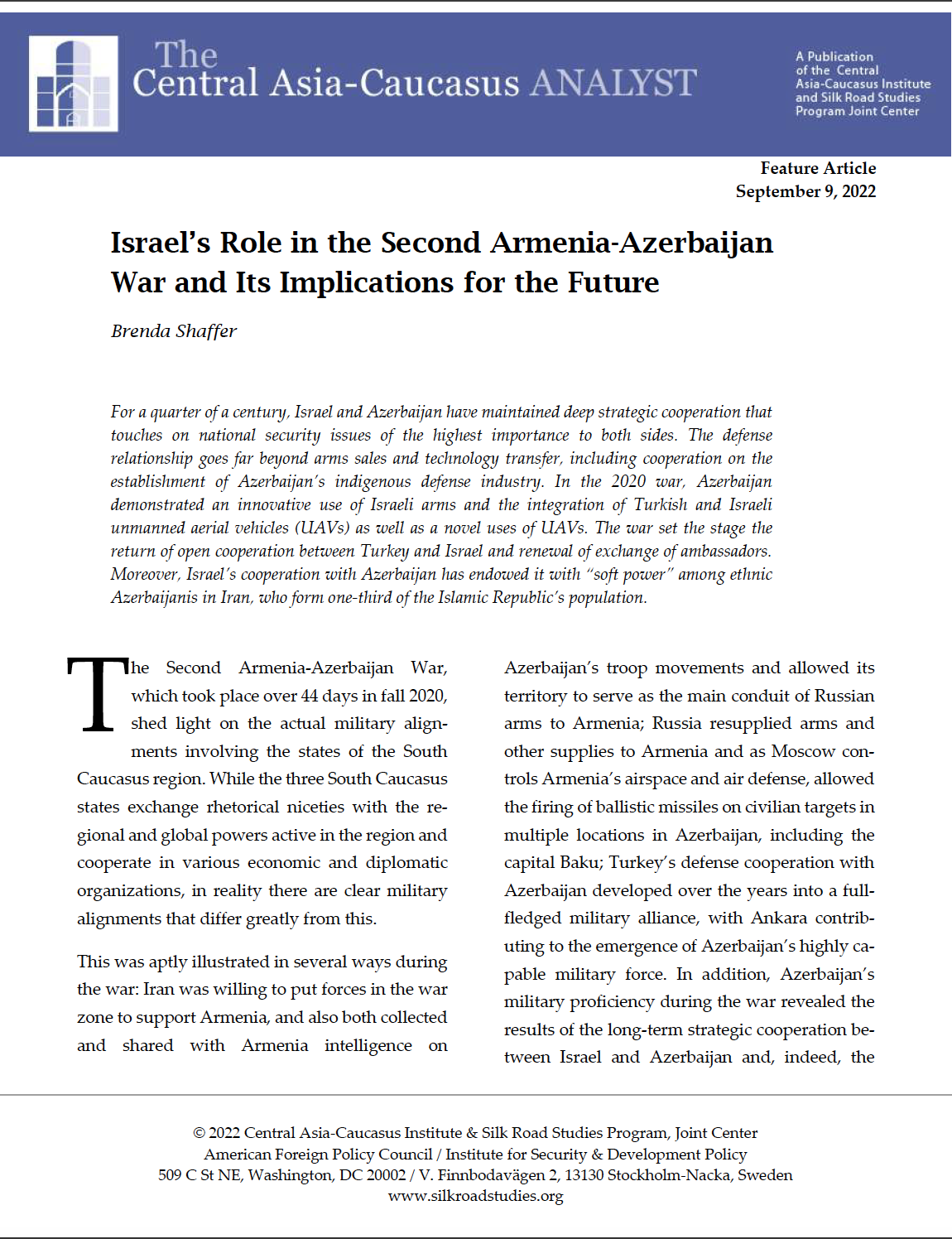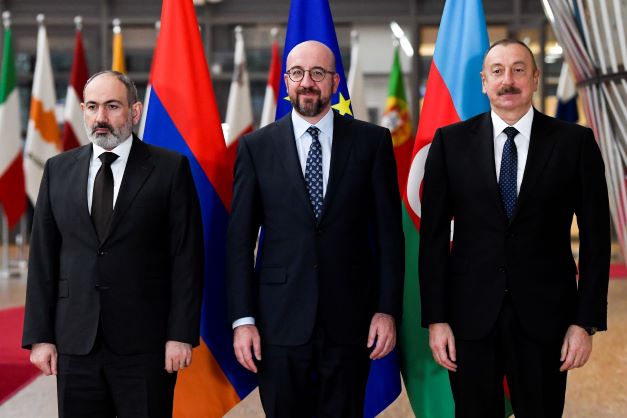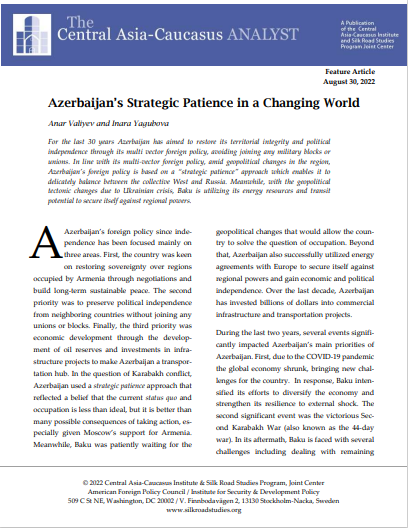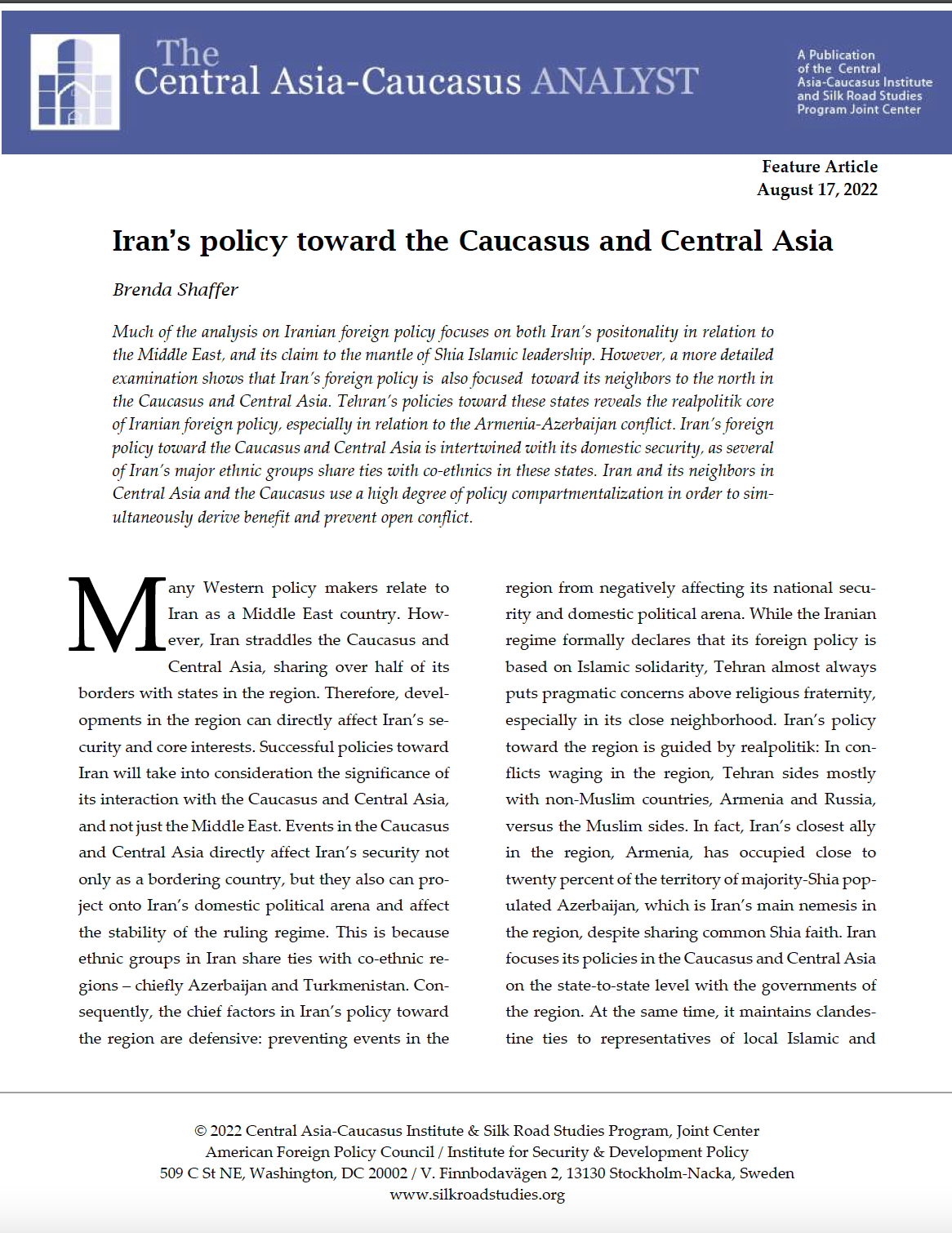Turkmenistan Lifts Its Head
By S. Frederick Starr
December 2, 2022
In recent months Turkmenistan has emerged from its self-imposed shell. Under its new president, Serdar Berdimuhamedov, it has launched a very active, though still cautious, foreign policy. While reaffirming its neutral status, which the UN recognized in 1995, it has intensified its relations with all the global powers and, significantly, with its neighbors as well. Both the U.S. and EU have applauded these initiatives and the new president’s strategic concept that underlies them. However, events unfold, Turkmenistan has decisively lifted its head, and will henceforth be a significant factor in regional and continental affairs and not simply a perplexing outlier.

Israel’s Role in the Second Armenia-Azerbaijan War and Its Implications for the Future
By Brenda Shaffer
September 9, 2022
 For a quarter of a century, Israel and Azerbaijan have maintained deep strategic cooperation that touches on national security issues of the highest importance to both sides. The defense relationship goes far beyond arms sales and technology transfer, including cooperation on the establishment of Azerbaijan’s indigenous defense industry. In the 2020 war, Azerbaijan demonstrated an innovative use of Israeli arms and the integration of Turkish and Israeli unmanned aerial vehicles (UAVs) as well as a novel uses of UAVs. The war set the stage the return of open cooperation between Turkey and Israel and renewal of exchange of ambassadors. Moreover, Israel’s cooperation with Azerbaijan has endowed it with “soft power” among ethnic Azerbaijanis in Iran, who form one-third of the Islamic Republic’s population.
For a quarter of a century, Israel and Azerbaijan have maintained deep strategic cooperation that touches on national security issues of the highest importance to both sides. The defense relationship goes far beyond arms sales and technology transfer, including cooperation on the establishment of Azerbaijan’s indigenous defense industry. In the 2020 war, Azerbaijan demonstrated an innovative use of Israeli arms and the integration of Turkish and Israeli unmanned aerial vehicles (UAVs) as well as a novel uses of UAVs. The war set the stage the return of open cooperation between Turkey and Israel and renewal of exchange of ambassadors. Moreover, Israel’s cooperation with Azerbaijan has endowed it with “soft power” among ethnic Azerbaijanis in Iran, who form one-third of the Islamic Republic’s population.
Azerbaijan’s Strategic Patience in a Changing World
By Anar Valiyev and Inara Yagubova
August 30, 2022
For the last 30 years Azerbaijan has aimed to restore its territorial integrity and political independence through its multi vector foreign policy, avoiding joining any military blocks or unions. In line with its multi-vector foreign policy, amid geopolitical changes in the region, Azerbaijan’s foreign policy is based on a “strategic patience” approach which enables it to delicately balance between the collective West and Russia. Meanwhile, with the geopolitical tectonic changes due to Ukrainian crisis, Baku is utilizing its energy resources and transit potential to secure itself against regional powers.
Iran’s policy toward the Caucasus and Central Asia
By Brenda Shaffer
August 17, 2022
Much of the analysis on Iranian foreign policy focuses on both Iran’s positonality in relation to the Middle East, and its claim to the mantle of Shia Islamic leadership. However, a more detailed examination shows that Iran’s foreign policy is also focused toward its neighbors to the north in the Caucasus and Central Asia. Tehran’s policies toward these states reveals the realpolitik core of Iranian foreign policy, especially in relation to the Armenia-Azerbaijan conflict. Iran’s foreign policy toward the Caucasus and Central Asia is intertwined with its domestic security, as several of Iran’s major ethnic groups share ties with co-ethnics in these states. Iran and its neighbors in Central Asia and the Caucasus use a high degree of policy compartmentalization in order to simultaneously derive benefit and prevent open conflict.
Karabakh Armenians Threaten to "Join Russia" as Armenia Turns Toward Peace with Azerbaijan
By Robert M. Cutler
May 9, 2022
Constructive developments in negotiations for peace between Armenia and Azerbaijan, particularly those mediated by the European Union, have produced a further radicalization of the opponents of such a peace. Russia is unhappy with EU and Western attempts to take the initiative for the peaceful normalization of relations between Azerbaijan and Armenia. Russia is seeking to use the Karabakh Armenians to maintain its geopolitical position in the South Caucasus. Threats have been voiced, in both Moscow and Khankendi [Stepanakert], of the intention to seek an annexation to Russia of areas in Nagorno-Karabakh where Russian troops are located.









 Book S. Frederick Starr and Svante E. Cornell,
Book S. Frederick Starr and Svante E. Cornell,